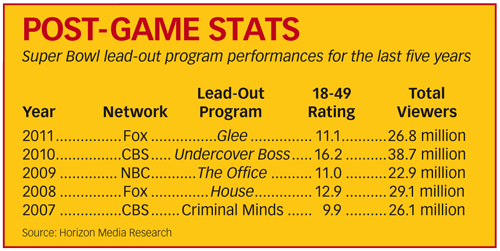Rookies Rarely Get to Play on Super Bowl Sunday

The smarter way to stay on top of broadcasting and cable industry. Sign up below
You are now subscribed
Your newsletter sign-up was successful
The Super Bowl, assumed to be TV’s biggest annual launch pad, has yielded such longrunning hits as The Wonder Years (1988) and Family Guy (1999). But the time slot has also produced its fair share of flops. In the 1980s and early ’90s, when it was commonplace to premiere a new series out of the Big Game, ABC’s MacGruder and Loud and Extreme, NBC’s The Last Precinct and The Good Life and CBS’ Hard Copy and Grand Slam all fell to cancelation the same season.
Since then, networks have often taken a different approach, tending to give the prime real estate to an existing yet on-the-rise series, hoping to spotlight it rather than risk setting up a new show with enormous expectations.
“The goal is to pick a show that’s still in its ascendancy,” said a network executive who requested anonymity. “Pick a show that’s still on the way up so that you can really get something from the additional exposure.”
That’s what NBC will do this year with The Voice, premiering the second season of the singing competition series out of its Super Bowl telecast on Feb. 5. It’s a vote of confidence by the network to bolster the series—a breakout hit in its rookie season—into the long-term franchise NBC desperately needs.
While the Super Bowl is routinely the most-watched telecast of the year, putting a series, even a hit one, after the game doesn’t necessarily expand its reach. Last year, Fox’s Glee drew an 11.1 rating in the 18-49 demo for its post-game episode but still ended its second season down from its premiere at a 4.7. In 2009, NBC’s The Office saw an audience close to 23 million after the Super Bowl and ended with 6.8 million in May, below the 9.3 million it averaged that season.
But putting an established show in the highly visible time period at least ensures that regular fans of the show will tune in (likely live) and allows the network to monetize the audience, an easier sell for an existing series than an unproven one. Fox in particular has made a practice of announcing its post-game scheduling at its upfront, allowing it to sell the pricey spots at a premium.
“Since the mid-’90s, it really hasn’t been about compatibility or launching a show—it’s generally been more about, ‘How do you spotlight your hot show and make some money in the process?’” said Preston Beckman, Fox executive VP, strategic program planning and research.
The exception to the rule in recent years was in 2010, when CBS launched the reality show Undercover Boss, a broad appeal series that could take advantage of a Super Bowl audience. The show drew more than 38 million viewers in its premiere episode and is now in its third season on CBS’ competitive lineup.
For NBC, the temptation could have been to premiere its mega-hyped Smash after the game, but apparently there were enough factors to keep the network from trotting out its star rookie in that high-profile slot. Additionally, unscripted series tend to be more consistent with the feel and audience of live football coverage (two editions of Survivor have drawn north of 30 million viewers after the Super Bowl for CBS). By going with The Voice, which is still a young show, NBC can expose it in a way it couldn’t in its regular primetime lineup.
“There is no better showcase on television than to follow the Super Bowl, and we believe The Voice is deserving of such high-profile exposure,” NBC Entertainment Chairman Bob Greenblatt said last May when announcing the scheduling. “The attention-grabbing blind audition phase of The Voice has mass appeal and will fittingly team up with the biggest sporting event of the year.”
However, NBC is being very careful to temper expectations for The Voice, which moves this year from Tuesdays to Mondays where it will face CBS’ powerhouse comedy block and ABC’s strong reality franchises The Bachelor and Dancing With the Stars. Though the network would of course hope to grow The Voice in season two, its appearance after the Super Bowl will at least remind fans of its return (perhaps a problem for American Idol this year) and help temper any ratings decline from the time-period change.
And the show’s season-two premiere episode has been set up for a ratings touchdown with the New England Patriots-New York Giants contest, a rematch of the incredibly exciting Super Bowl XLII and featuring two big media markets, which should put the audience in line with the last several years’ record-breaking viewership. Now NBC must hope The Voice can convert on it to become a lasting player.
“Anything you put there is going to do well—the real question is what’s the long-term benefit,” the network executive said.
E-mail comments to amorabito@nbmedia.com and follow her on Twitter: @andreamorabito
The smarter way to stay on top of broadcasting and cable industry. Sign up below
